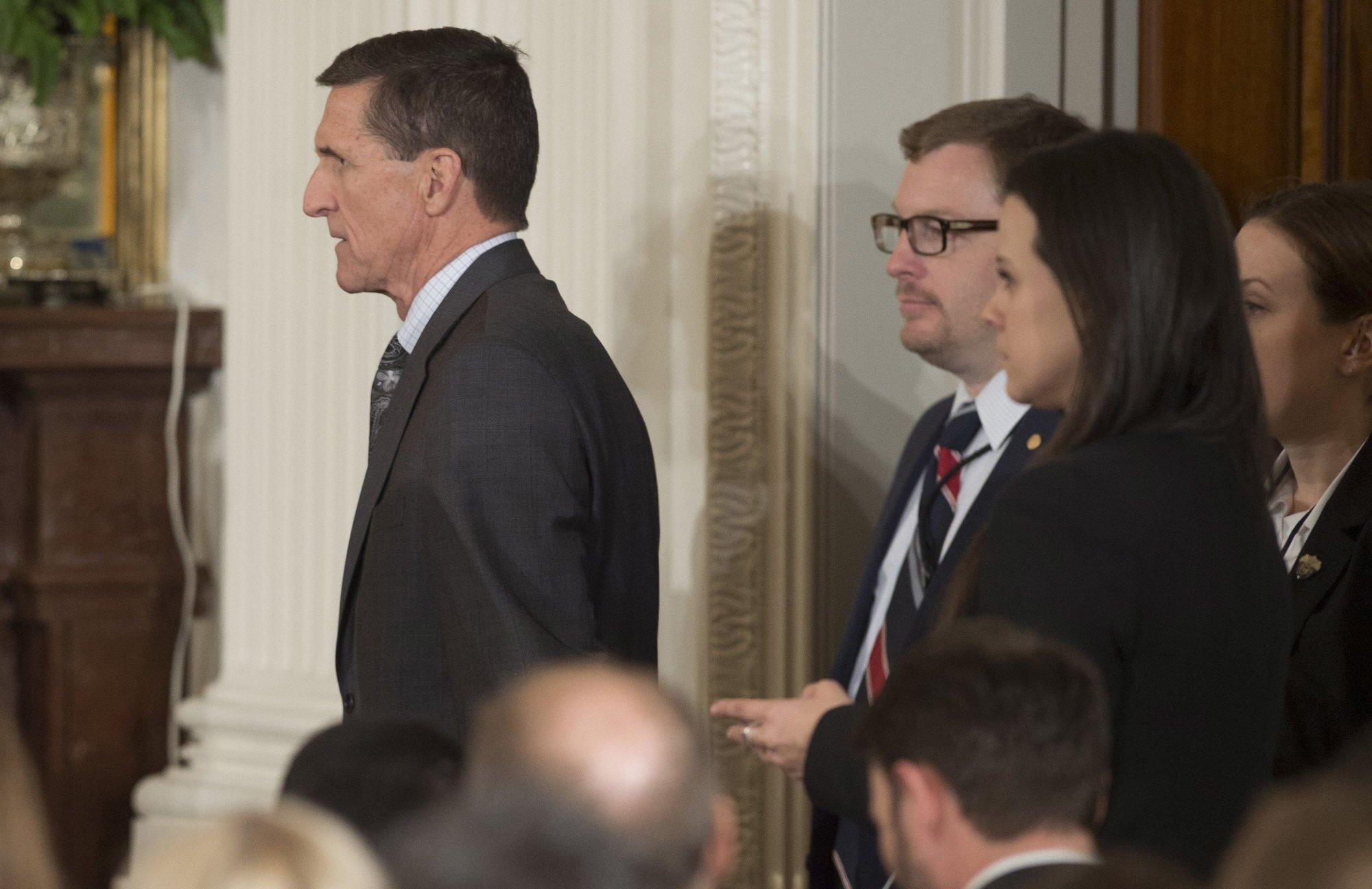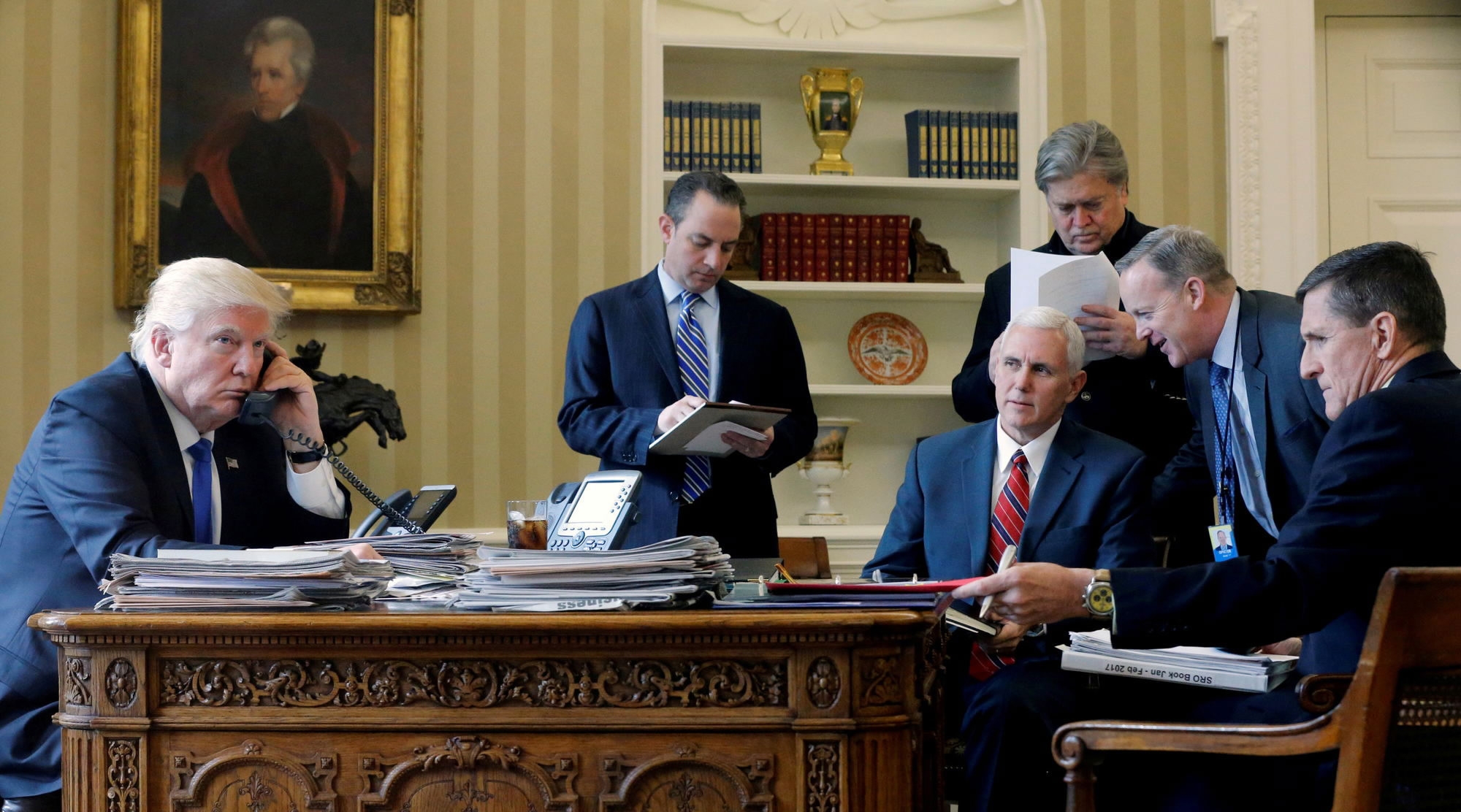Guest commentary by Hichem Karoui
While Democrats and liberals are now questioning the connections of Trump’s White House with Moscow, Lieutenant-General Michael T. Flynn seems to be the first scapegoat in this battle. A battle nurtured by a growing feud between different political groups in the US over Moscow’s assumed meddling with US domestic politics.
Whatever he did, the national security advisor of President Trump, clearly did not know his own camp very much -- or at least underestimated the resistance to his plans.
First, hostility toward Moscow is not confined to those who lost the elections. It is widespread in US conservative think tanks.

Michael Flynn arrives for a press conference between US President Donald Trump and Canadian Prime Minister Justin Trudeau in the East Room of the White House in Washington, DC, on February 13, 2017. /CFP Photo
At the American Enterprise Institute (AEI) you can read papers such as, “The United States’ central goal is to slow down and eventually reverse Putin’s activist foreign policy” written by Leon Aron, their Director of Russian Studies.
Another US think tank, Jamestown Foundation, recently published a paper that included this thought: “Attitudes in Moscow [that] seem to be hardening, with a clear signal sent to Washington that any deal possibly tacitly recognizing Russian control of Crimea in exchange for a withdrawal and pacification of Donbas is unacceptable. Ukraine, as a pro-Western state seeking to join NATO and the European Union sometime in the future, is equally unacceptable to Russia.”
At the Hoover Institution, yet another US think tank talks about “the rise of China [and] a revanchist Russia,” both of which “have failed to live up to treaty obligations” and thus “contributed to a malaise that has affected the American psyche.”
For the majority of conservative think tanks, the grand strategy that will make “America Great Again” roughly translates as “no more of the same.”
Flynn did change the way he operated to fit into this increasingly hostile stance against Russia. The US needed a « tough » man for the job, not a diplomat.

US President Donald Trump (L), joined by Michael Flynn(R), speaks by phone with Russia's President Vladimir Putin in the Oval Office at the White House in Washington, US, onJanuary 28, 2017. /CFP photo
So far, there are no hints that he broke the law. His talks with Ambassador Sergey Kislyak about US sanctions go back to late last year. They continued over phone calls, as he acknowledged in his resignation letter. That was already over the line given the tough position conservative think tanks are advising the White House to take concerning some strategic matters.
Not only did Flynn fail to deliver on this issue as he was expected to, but he even gave “incomplete information” about his talks with Russia to high ranking US officials, including the Vice-President.
He somehow embarrassed Trump. The choice of the president was questioned. True, Donald Trump wished to cooperate with Putin, but the issues of possible cooperation have so far been limited to the Middle East (i.e. Syria, terrorism, etc.). In the Baltics, right-wing experts say Russia routinely violates NATO airspace. Even in Turkey, “brinkmanship along the Syrian border could spark a conflict, triggering Article 5 of the NATO Charter”, writes one of AIE’s think tank directors Aron.
Now to the question, is it possible that the real reason Michael T. Flynn, was “sacrificed” was for political interests rather than anything he personally did? - The answer is very likely.
For him, it wouldn’t be the first time, though.
In August 2014, he retired abruptly, after two years as Defense Intelligence Agency (DIA) Director. Flynn was chosen at a time the DIA unveiled an ambitious plan to expand its small corps of spies, which it branded the Defense Clandestine Service (DCS). He made the effort a top priority. The idea ran into trouble from the start, with some CIA officials actively working to block the emergence of what they saw as a potential rival to the CIA's National Clandestine Service (NCS).
As national security adviser, his own ideas about how to deal with Moscow encountered resistance inside the conservative camp, as well as resistance from the CIA, which Flynn accused of being pro-Obama.
(Dr. Hichem Karoui is Non-Resident Senior Fellow at the Center for China and Globalization (CCG), Beijing, and a diplomatic advisor. The article reflects the author's opinion, not necessarily the view of CGTN.)
11174km










